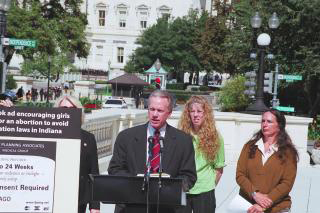
WASHINGTON (BP)–The House of Representatives passed Sept. 26 for the second time this Congress a bill to outlaw interstate abortions on minors without parental notice.
Representatives voted 264-153 for a compromise version of bills passed earlier this year by the Senate and House. Supporters of the measure hope the Senate also will approve the legislation, but there is no guarantee that chamber will act before it recesses Sept. 29 or 30.
The substitute for the Child Custody Protection Act, S. 403, is intended to prevent the transportation of underage girls across state lines to obtain abortions in avoidance of parental involvement laws in the girls’ home states.
Some minors travel from or are transported from states with parental involvement laws to neighboring states that have no such laws in order to undergo abortions. Abortion clinics in states without parental consent or notification laws sometimes advertise their services in adjacent states that have such laws.
The Senate adopted the CCPA by a 65-34 margin in July, 15 months after the House passed its version with a 270-157 vote.
After Senate passage July 25, Majority Leader Bill Frist moved for the bill to go to a conference committee, where differences between it and the House measure could be reconciled. Sen. Richard Durbin, D.-Ill., the assistant minority leader, objected to the normally routine request, thereby halting the advance of the bill. Twice more, the Democrats blocked the bill’s progress by objecting.
House supporters acted in an attempt to break the blockage by including in the substitute all of the provisions in the Senate-approved bill, as well as the main condition of their version. The substitute measure includes a Senate provision that bars a father who impregnates his daughter from taking her to another state for an abortion or from suing a person who provides such transportation. The substitute also maintains a House requirement that an abortion doctor in a state without a parental involvement law inform a parent before he performs an abortion on a minor girl who lives in a different state.
“I commend the House for their heroic action on behalf of parents and their young daughters,” said Barrett Duke, vice president of public policy and research for the Southern Baptist Ethics & Religious Liberty Commission. “This bill will help restore parents’ biblical, moral and legal responsibility to be aware of and involved in the well-being of their daughters.
“Yet, we cannot be sure the Senate will even act on it. I hope everyone who cares about this issue will pick up their phones or send an e-mail right away and tell their senators that they want them to vote for the Child Interstate Abortion Notification Act as passed by the House on Sept. 26. There is no time to delay. The future of unborn babies and their mothers is in the balance.”
The ERLC sent out an alert Sept. 27 calling for its constituents to e-mail or call their senators urging them to vote for S. 403. The Capitol switchboard number is 202-224-3121.
President Bush has said he will sign the legislation if it arrives on his desk.
There are 29 states that have effective parental involvement laws that are not being blocked by courts.
NARAL Pro-choice America, the National Abortion Federation and Planned Parenthood Federation of America are among the abortion rights organizations that have fought passage of the measure.
Some studies have shown a majority of minors who become pregnant are impregnated by men 18 or older. The men, or their family members, sometimes take the minors across state lines to obtain abortions. Supporters of the proposals to ban such activities argue that these men have an incentive to keep the pregnancy hidden by means of secret abortions, since they are vulnerable to statutory rape charges.
In an April 2005 survey by The Polling Co., 82 percent of Americans disagreed with a person being able “to take a minor girl across state lines to obtain an abortion without her parents’ knowledge.”
–30–















